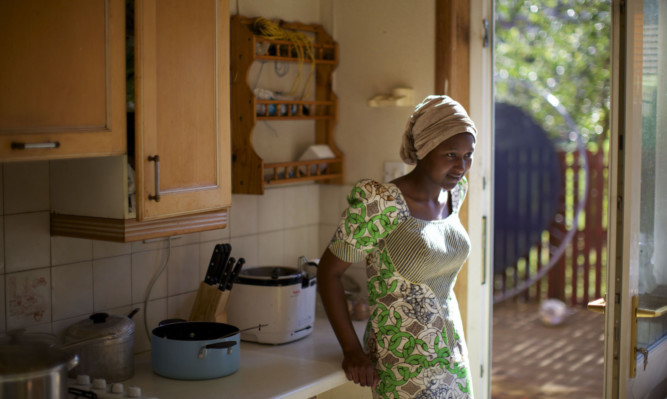For the first time ever in this country the referendum on Scottish independence gives 16 and 17-year-olds the chance to vote. Helen Brown talked to Halima Kolo, who appears in this Sunday’s BBC Scotland documentary about being 16 in 2014.
Being 16 in 2014 is a programme that does exactly what it says on the tin. It’s a different view of youth culture from the perspective of the young themselves in their own words and voices, with no commentary or narration to interrupt or distort how these typical, yet highly individual characters see their life and times.
It opens up the world of young people living in Scotland, teenagers from all different backgrounds and walks of life who are not only on the brink of making some of the biggest personal decisions of their young lives. In less than three weeks’ time, they will also have both a say in what their future homeland will look like and a vote to back it up. It’s pioneering politics nearly 100,000 in the eligible age group have registered to take part and their contribution, pro or con, could be crucial.
And yet it’s still a time of life for most young people that, while full of potential and possibilities, is also fraught with difficulties, problems and pressures. These kids are dealing with everything from vital exams to hormonal and emotional changes, the awkwardness of fitting in with the crowd or standing out from it, what they wear, what they look like, how they get on with their peers and parents, where education might or might not take them and how they spend their time, from scouting to social networking.
It’s a lot to deal with and think about at the best of times. Brandon, from Cumbernauld, reiterated the cry of the teenager since probably long before that term was even invented. “No-one listens to ME.” Ida a sparky girl feeling very much confined by the geography of her life in remote Morar, probably puts it at its scary best. “You’re making life decisions even though you haven’t lived most of your life.” And no bigger decision, perhaps, than one that shapes your country’s future.
That’s something that’s very much to the fore for Halima Kolo, born in Nigeria, who has lived in Dundee for the past eight years. “I think it’s important that adults are depending on us; that they feel they can depend on us and that we’re trusted,” she says. “My brother is 18 and when he was 16, he and his age group weren’t trusted like this. It’s quite a privilege, being depended on for the future.”
One of Halima’s teachers suggested that she should apply to be part of the BBC programme and she admits that she was “really scared!” at the interviews in Edinburgh and didn’t feel she had answered as well as some of the other potential participants. “I was shocked when the email came in saying they’d like me to be in it. My friends kept saying: ‘You’re going to be famous!’ ”
Currently in her fifth year at St John’s High School in the city, Halima is an only daughter, with four brothers and a large extended family with whom she loves to spend time. She came to live in Dundee when she was coming up for eight years old but her family retains its links with Nigeria and a recent visit for a family wedding was recorded for this documentary.
And being 16, as she says on screen: “…is the best thing ever. You can try everything or most things and not take everything too seriously. You can live in the moment as a child.” But moving on is part of the bigger picture, too. She has strong feelings for both countries and loves the fact that she still has her Nigerian “self” going back to her home nation, she says in the documentary footage, helped her to pick up how to be a woman, more mature and grown up. And it encouraged her to think about doing more cooking, something she hadn’t tried much before!
But she still feels very Scottish, very “from here”. She says: “I do feel privileged not many people get the opportunities I’m having to study and learn. When you think of the dangers in Nigeria, the kidnappings and bombings, there are many of those girls who would love to be doing what I’m doing, having these chances.”
She may be going back to visit Nigeria again at the end of the year but before then, she hopes to get the grades to take her to university to study philosophy, probably out in the wider world. For her, it’s a special and interesting time to be young in Scotland. But it’s not perfect, as she tells the cameras. “I would like to live somewhere warm, like Bora Bora!”
I watched the first of this two-part series and was seriously impressed by how articulate, caring and thoughtful most of these young people were. I don’t know if they were wise beyond their years but if they can carry their youthful freshness, determination and individuality into their later lives, I think all our futures may be in very safe hands.
Being 16 in 2014 Part 1 is on BBC2 Scotland on Sunday August 31 from 9-10pm.
